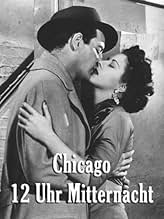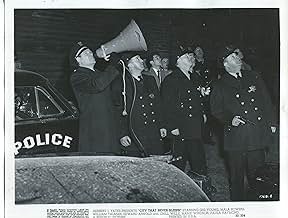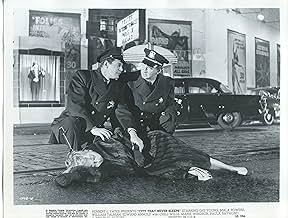ÉVALUATION IMDb
6,7/10
1,7 k
MA NOTE
Ajouter une intrigue dans votre langueJohnny Kelly, who plans on resigning from the police force and leaving his wife the next day, has a very eventful last night on duty.Johnny Kelly, who plans on resigning from the police force and leaving his wife the next day, has a very eventful last night on duty.Johnny Kelly, who plans on resigning from the police force and leaving his wife the next day, has a very eventful last night on duty.
Tom Poston
- Detective
- (as Thomas Poston)
Roy Barcroft
- Mechanical Man Attraction Hawker
- (voice)
- (uncredited)
Helen Gibson
- Woman
- (uncredited)
Histoire
Le saviez-vous
- AnecdotesFirst credited feature film for actor-comedian Tom Poston.
- GaffesStuntman Dale Van Sickel is clearly seen instead of actor William Talman in the shot where Hayes Stewart jumps over the skylight during the rooftop chase.
- Citations
Sally 'Angel Face' Connors: When I first came to this town I was gonna be - oh, there were a lot of things I was gonna do. Become famous. But Chicago's the big melting pot, and I got melted, but good.
- Générique farfeluThis motion picture is respectfully dedicated to the police and police departments of America - a brave army of men and women who form our first line of defense in preserving our sacred principles of personal liberty and justice. We gratefully acknowledge the valuable assistance given by the City of Chicago and its police and Police Department, whose cooperation made this picture possible.
- ConnexionsReferenced in Ôsaka no yado (1954)
Commentaire en vedette
...is but one of the many elements in this quirky film that makes it SO enjoyable. The plot is complex, but still masterfully laid out, the dialogue is clean and effective, and the imaginative direction, lighting, cinematography and editing clearly place "City" in the ranks of minor classics.
In fact, you are rarely aware that this was a low-budget Republic Studios pic. There's one scene near the end...the standard "calling all cars" scene in the police station, which could have been shot with a single guy at a microphone with a bare wall behind him; instead, we see a bee-hive of activity, with several radio cops reflected in a magical labyrinth of glass panes, with shadowy figures passing through the hallway in back of them. It's seemingly insignificant details such as this that keep "City" bristling with intense visuals and character interplay from beginning to end (yeah, the scene with William Talman breaking into Edward Arnold's office at night could have been edited down to about half its length, and the continually recurring stock footage of the police car's POV while racing past a bunch of 1940's parked cars is pretty comical).
Having a heavyweight actor like Arnold in a pivotal role lends acting "gravitas"; William Talman, an actor I've never really cared for, is superb---subtle, cunning, and ultimately maniacal. The confusion between John Kelly Sr. and Jr. as the tension builds is but one of the masterful plot devices, and the subplot of the Mechanical Man (Wally Cassell) and his dreams of an idyllic life with his lady love amidst the wonders of nature is positively brilliant, as is his change of heart and willingness to sacrifice himself for a noble cause. Cassell's physical skill is as impressive as the emotional sensitivity he brings to the role* And how about mother-in-law's offstage nagging of Gig Young? I found it subtly creepy, almost like mother's voice in PSYCHO.
On top of it all, we have the Chill Wills character; you must decide for yourself if it helps or harms the film; I took it as just another off-beat element in this imaginative story of a single night in Chicago. Who knows?--maybe the whole thing was a bad dream from which Gig Young wakes up at the end.
Only Mala Powers disappoints in her role; she was rather miscast as the tough, world-weary dame, though her more sensitive scenes are fine.
* NOTE - The December 22nd, 1960 episode of TV's June Allyson Show was entitled "SILENT PANIC", and featured HARPO MARX as a deaf-mute who works at Christmastime as a Mechanical Man in a department store window; he also happens to be the only eyewitness to a murder on the street. Sound familiar? Unfortunately, the hour-long show fails miserably to live up to its fascinating premise. But I wonder how many other films, radio shows, stories, etc have used this novel plot device over the years.
In fact, you are rarely aware that this was a low-budget Republic Studios pic. There's one scene near the end...the standard "calling all cars" scene in the police station, which could have been shot with a single guy at a microphone with a bare wall behind him; instead, we see a bee-hive of activity, with several radio cops reflected in a magical labyrinth of glass panes, with shadowy figures passing through the hallway in back of them. It's seemingly insignificant details such as this that keep "City" bristling with intense visuals and character interplay from beginning to end (yeah, the scene with William Talman breaking into Edward Arnold's office at night could have been edited down to about half its length, and the continually recurring stock footage of the police car's POV while racing past a bunch of 1940's parked cars is pretty comical).
Having a heavyweight actor like Arnold in a pivotal role lends acting "gravitas"; William Talman, an actor I've never really cared for, is superb---subtle, cunning, and ultimately maniacal. The confusion between John Kelly Sr. and Jr. as the tension builds is but one of the masterful plot devices, and the subplot of the Mechanical Man (Wally Cassell) and his dreams of an idyllic life with his lady love amidst the wonders of nature is positively brilliant, as is his change of heart and willingness to sacrifice himself for a noble cause. Cassell's physical skill is as impressive as the emotional sensitivity he brings to the role* And how about mother-in-law's offstage nagging of Gig Young? I found it subtly creepy, almost like mother's voice in PSYCHO.
On top of it all, we have the Chill Wills character; you must decide for yourself if it helps or harms the film; I took it as just another off-beat element in this imaginative story of a single night in Chicago. Who knows?--maybe the whole thing was a bad dream from which Gig Young wakes up at the end.
Only Mala Powers disappoints in her role; she was rather miscast as the tough, world-weary dame, though her more sensitive scenes are fine.
* NOTE - The December 22nd, 1960 episode of TV's June Allyson Show was entitled "SILENT PANIC", and featured HARPO MARX as a deaf-mute who works at Christmastime as a Mechanical Man in a department store window; he also happens to be the only eyewitness to a murder on the street. Sound familiar? Unfortunately, the hour-long show fails miserably to live up to its fascinating premise. But I wonder how many other films, radio shows, stories, etc have used this novel plot device over the years.
- lrrap
- 9 mai 2013
- Lien permanent
Meilleurs choix
Connectez-vous pour évaluer et surveiller les recommandations personnalisées
- How long is City That Never Sleeps?Propulsé par Alexa
Détails
- Durée1 heure 30 minutes
- Couleur
- Rapport de forme
- 1.37 : 1
Contribuer à cette page
Suggérer une modification ou ajouter du contenu manquant

Lacune principale
By what name was City That Never Sleeps (1953) officially released in India in English?
Répondre
































